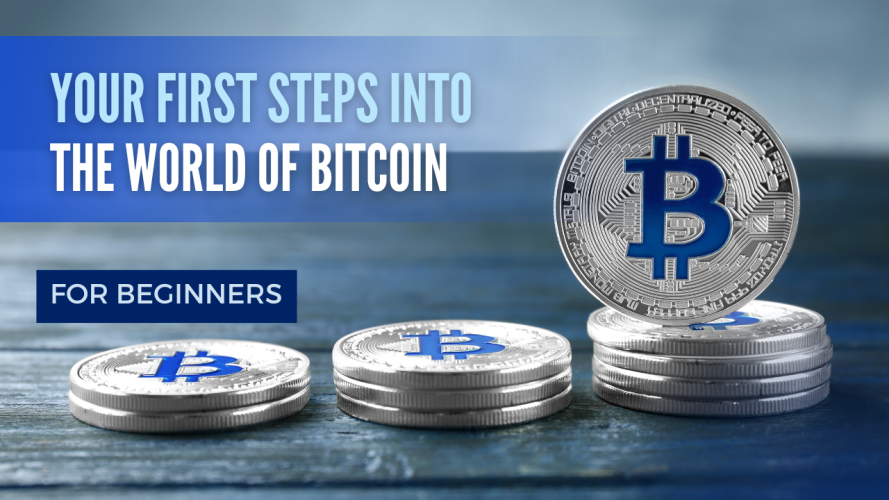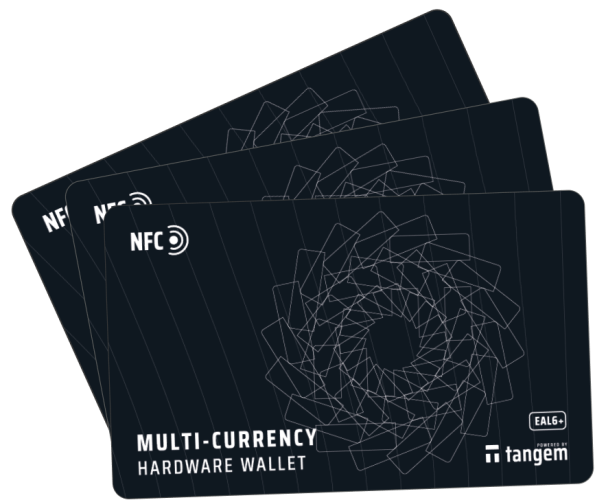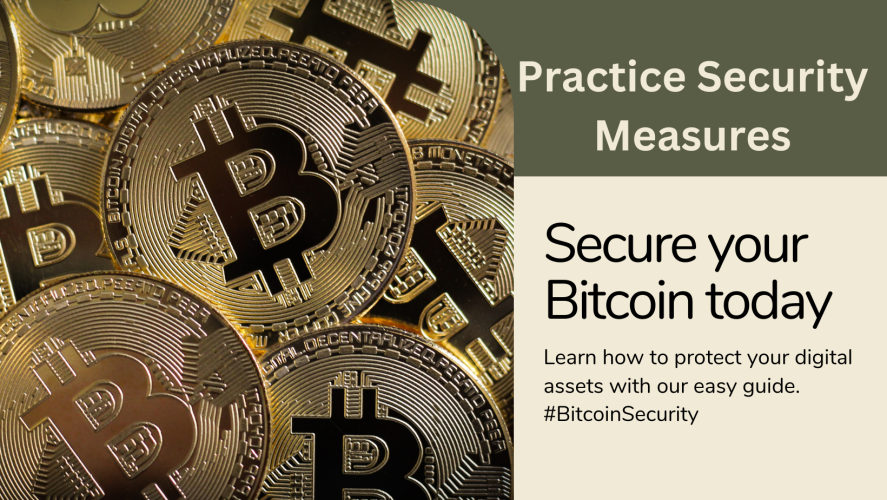Getting Started: Your First Steps into the World of Bitcoin.

Introduction:
In the ever-evolving landscape of digital finance, Bitcoin stands as a revolutionary force, offering individuals unprecedented autonomy over their financial transactions and investments. As you embark on your journey into the world of Bitcoin, it's essential to understand the fundamental principles that underpin this transformative digital currency.
From its inception in 2009 by the pseudonymous Satoshi Nakamoto to its meteoric rise in popularity and adoption, Bitcoin has captured the imagination of investors, technologists, and enthusiasts worldwide. In this comprehensive guide, we will explore the essential steps for beginners to get started with Bitcoin, demystifying its intricacies and equipping you with the knowledge and tools necessary to navigate this decentralized ecosystem with confidence.
Whether you're a seasoned investor looking to diversify your portfolio or a curious newcomer eager to explore the possibilities of digital currency, this guide will provide you with the foundational knowledge and practical insights needed to take your first steps into the world of Bitcoin.
Join us as we unravel the mysteries of blockchain technology, delve into the mechanics of Bitcoin transactions, and explore the myriad opportunities and challenges that lie ahead on your journey towards financial empowerment and independence.
1. Understanding Bitcoin Basics:

Begin your journey by grasping the fundamental concepts of Bitcoin, including its decentralized nature, blockchain technology, and limited supply.
Understanding Bitcoin basics is crucial for anyone looking to venture into the world of cryptocurrency. At its core, Bitcoin is a decentralized digital currency that operates on a peer-to-peer network, allowing users to send and receive transactions without the need for intermediaries like banks or payment processors.
The cornerstone of Bitcoin's functionality lies in blockchain technology, a distributed ledger system that records all transactions transparently and immutably. Unlike traditional fiat currencies, which are issued and regulated by central authorities, Bitcoin operates autonomously, with its supply capped at 21 million coins.
Bitcoin transactions are secured through cryptographic algorithms, ensuring the integrity and confidentiality of each transaction. Additionally, Bitcoin's deflationary nature, combined with its finite supply, distinguishes it from fiat currencies and positions it as a store of value.
Aspiring Bitcoin enthusiasts must grasp these fundamental concepts to navigate the complexities of the cryptocurrency market effectively and make informed investment decisions. Whether you're a novice or seasoned investor, understanding Bitcoin basics lays the foundation for exploring its myriad applications, from peer-to-peer payments to decentralized finance and beyond.
2. Educate Yourself:
Dive into reputable resources such as online articles, books, and educational platforms to deepen your understanding of Bitcoin and its ecosystem. Educating yourself about Bitcoin is an essential step for anyone interested in entering the cryptocurrency space.
With an abundance of resources available, from online courses and tutorials to books and forums, there are numerous avenues to gain knowledge about Bitcoin and blockchain technology. Begin by familiarizing yourself with the fundamentals of Bitcoin, including its history, underlying technology, and economic principles.
Dive into reputable sources such as whitepapers, academic papers, and industry-leading websites to deepen your understanding of the intricacies of Bitcoin. Explore the broader cryptocurrency ecosystem to gain insights into alternative cryptocurrencies, blockchain projects, and emerging trends.
Engage with online communities and forums to connect with like-minded individuals, share knowledge, and seek guidance from experienced members. Consider attending blockchain conferences, workshops, and meetups to network with industry professionals and gain firsthand insights into the latest developments in the field. Remember that learning about Bitcoin is an ongoing process, and staying informed about new advancements and regulatory changes is crucial for navigating the dynamic cryptocurrency landscape.
By committing to continuous education and seeking out diverse perspectives, you can equip yourself with the knowledge and skills needed to make informed decisions and thrive in the world of Bitcoin.
3. Choose a Secure Wallet:

Select a reliable Bitcoin wallet to store your digital assets securely. Opt for wallets with robust security features and a user-friendly interface. Choosing a secure wallet is paramount when entering the world of Bitcoin. With a plethora of options available, selecting the right wallet ensures the safety and protection of your digital assets.
Consider factors such as security features, user interface, and compatibility with your devices when choosing a wallet. Hardware wallets, such as Ledger and Trezor, offer enhanced security by storing your private keys offline, protecting them from online threats.
Software wallets, such as Electrum and Exodus, provide convenient access to your Bitcoin holdings via desktop or mobile applications, but require robust security measures to safeguard against hacking and malware. Research different wallet providers, read reviews, and seek recommendations from trusted sources to find a reputable and reliable wallet solution.
Prioritize wallets that offer features like multi-signature support, two-factor authentication (2FA), and seed phrase backup to enhance the security of your funds. Remember to keep your wallet software updated and follow best practices for securing your private keys to mitigate the risk of unauthorized access.
By choosing a secure wallet that aligns with your needs and preferences, you can enjoy peace of mind knowing that your Bitcoin holdings are protected against potential threats and vulnerabilities.
Tangem. (very user friendly )wallet.

Slim as a bank card, secure as a bank vault. Store, buy, earn, transfer and swap thousands of coins and tokens.
From $54.90…watch this video for more info.
4. Explore Exchanges:
Research and compare different cryptocurrency exchanges to find one that suits your needs. Ensure the exchange is reputable, offers adequate security measures, and supports Bitcoin trading. Exploring exchanges is a crucial step in your journey into the world of Bitcoin.
These platforms serve as the gateway to buying, selling, and trading cryptocurrencies, including Bitcoin. When selecting an exchange, consider factors such as security, fees, liquidity, and supported cryptocurrencies. Established exchanges like Coinbase, Binance, and Kraken offer a user-friendly interface, robust security measures, and a wide range of trading pairs, making them popular choices for beginners and experienced traders alike.
Research different exchanges, read reviews, and compare features to find the platform that best meets your needs. Pay attention to factors like transaction fees, deposit and withdrawal methods, and customer support quality to ensure a seamless trading experience.
Additionally, consider the regulatory compliance and reputation of the exchange to mitigate the risk of fraudulent activities. Once you've chosen an exchange, create an account, complete the necessary verification process, and fund your account to start trading Bitcoin.
Remember to exercise caution and practice risk management when trading on exchanges, as the cryptocurrency market can be highly volatile. By exploring reputable exchanges and familiarizing yourself with their features, you can confidently navigate the world of Bitcoin trading and investment.
5. Complete KYC Verification:

Many exchanges require Know Your Customer (KYC) verification to comply with regulatory requirements. Prepare necessary documents such as government-issued ID and proof of address to complete the verification process. Completing Know Your Customer (KYC) verification is an essential step when registering with cryptocurrency exchanges.
KYC verification is a regulatory requirement aimed at preventing fraud, money laundering, and other illicit activities in the cryptocurrency space. To complete KYC verification, you'll need to provide personal information and documentation to verify your identity.
This typically includes a government-issued ID, proof of address, and sometimes additional documents such as a passport or driver's license. While KYC verification may seem intrusive, it helps ensure the security and legitimacy of cryptocurrency transactions on the exchange. Once you've submitted the required documents, the exchange will review them and verify your identity, usually within a few days.
Once verified, you'll gain access to additional features and higher transaction limits on the exchange. KYC verification is a standard practice across reputable cryptocurrency exchanges and is necessary to comply with regulatory requirements in many jurisdictions. By completing KYC verification, you can trade with confidence, knowing that you're operating on a legitimate and compliant platform.
6. Purchase Bitcoin:
Once your exchange account is set up and verified, initiate your first Bitcoin purchase. Start with a small investment and gradually increase your holdings as you gain confidence. Purchasing Bitcoin is a fundamental step for anyone looking to enter the world of cryptocurrency.
There are various methods to acquire Bitcoin, including through cryptocurrency exchanges, peer-to-peer platforms, Bitcoin ATMs, and even through over-the-counter (OTC) transactions. When purchasing Bitcoin, it's essential to choose a reputable and secure platform that aligns with your preferences and requirements.
Consider factors such as fees, supported payment methods, security features, and liquidity when selecting an exchange or platform. Once you've chosen a platform, create an account, complete the necessary KYC verification, and fund your account using the preferred payment method.
After funding your account, navigate to the Bitcoin trading pair and place a buy order at the desired price. Alternatively, you can use peer-to-peer platforms or Bitcoin ATMs to purchase Bitcoin directly from sellers or machines using cash or other payment methods.
Regardless of the method you choose, ensure that you're purchasing Bitcoin from a trusted source and follow best practices for securing your digital assets. By purchasing Bitcoin, you're taking the first step towards participating in the decentralized revolution and potentially benefiting from the growth and innovation of the cryptocurrency ecosystem.
.jpg)
Wanna Make Money with Crypto? It’s never too late to get started
Buy, store and learn about Bitcoin, Ethereum, XRP and Litecoin now
Go here >>> https://luno.com/invite/MJ37M
7. Practice Security Measures:

Implement strong security practices such as enabling two-factor authentication (2FA), using complex passwords, and storing your private keys offline to protect your Bitcoin holdings from potential threats.
Practicing security measures is paramount when dealing with Bitcoin and other cryptocurrencies to safeguard your digital assets from theft, hacking, and other security threats. Start by using a secure and reputable wallet, such as hardware wallets likeTangem, Ledger or Trezor, to store your Bitcoin offline and protect your private keys from online threats.
Enable two-factor authentication (2FA) wherever possible to add an extra layer of security to your accounts. Additionally, regularly update your wallet software and operating systems to patch any security vulnerabilities. Be cautious of phishing attempts and never disclose your private keys or sensitive information to anyone. Keep your recovery seed phrase secure and never share it with anyone else.
Consider using a VPN (Virtual Private Network) when accessing cryptocurrency exchanges or wallets to encrypt your internet connection and protect your privacy. Furthermore, be vigilant of suspicious websites, emails, or messages that may attempt to deceive you into divulging personal information.
By adopting these security measures and staying informed about the latest security practices, you can significantly reduce the risk of unauthorized access and protect your Bitcoin investments effectively.
8. Stay Informed:
Stay updated on the latest news, trends, and developments in the Bitcoin space by following reputable cryptocurrency news websites, forums, and social media channels.
Staying informed about the latest developments and trends in the cryptocurrency space is essential for any Bitcoin enthusiast. Follow reputable sources such as cryptocurrency news websites, forums, blogs, and social media channels to stay updated on market movements, regulatory changes, technological advancements, and industry insights.
Join online communities and forums to engage with like-minded individuals, share knowledge, and seek advice from experienced members. Attend blockchain conferences, webinars, and meetups to network with industry professionals and gain firsthand insights into the latest developments.
Subscribe to newsletters and email alerts from trusted sources to receive timely updates and analysis delivered directly to your inbox. Keep an eye on reputable cryptocurrency exchanges and trading platforms for real-time market data and trading opportunities. Furthermore, explore educational resources such as online courses, tutorials, and whitepapers to deepen your understanding of Bitcoin and blockchain technology.
By staying informed and continuously learning about the cryptocurrency space, you can make informed decisions, stay ahead of market trends, and navigate the dynamic landscape of Bitcoin effectively.
9. Diversify Your Portfolio:
.png)
Consider diversifying your investment portfolio by exploring other cryptocurrencies and blockchain projects alongside Bitcoin.
Diversifying your portfolio is a prudent strategy to mitigate risk and maximize returns in the volatile world of cryptocurrency. Rather than putting all your eggs in one basket, spread your investments across different cryptocurrencies, asset classes, and investment strategies.
Consider allocating a portion of your portfolio to established cryptocurrencies like Bitcoin and Ethereum, which have a track record of stability and growth, while also exploring promising altcoins and tokens with potential for high returns. Additionally, diversify across different investment vehicles such as long-term holds, trading, staking, lending, and decentralized finance (DeFi) opportunities.
Balance high-risk, high-reward investments with more conservative options to minimize exposure to market fluctuations. Furthermore, consider diversifying outside of the cryptocurrency space by investing in traditional assets like stocks, bonds, and precious metals to further spread risk and hedge against potential downturns in the crypto market.
Regularly review and rebalance your portfolio to maintain your desired asset allocation and adapt to changing market conditions. By diversifying your portfolio intelligently, you can enhance your risk-adjusted returns and build a more resilient investment strategy for the long term.
10. Understand Risks:
Be aware of the risks associated with investing in Bitcoin, including price volatility, regulatory uncertainty, and security vulnerabilities.
Understanding the risks associated with investing in Bitcoin and other cryptocurrencies is crucial for making informed decisions and managing your investment portfolio effectively. Cryptocurrency markets are inherently volatile, with prices subject to rapid fluctuations driven by factors such as market sentiment, regulatory developments, and technological advancements.
Recognize that investing in cryptocurrencies carries the risk of significant price volatility, potential loss of capital, and exposure to security threats such as hacking and fraud. Additionally, consider the regulatory landscape and potential regulatory changes that could impact the legality and use of cryptocurrencies in different jurisdictions.
Be mindful of liquidity risks, especially when trading lesser-known altcoins with lower trading volumes, which may be more susceptible to price manipulation. Understand the risks associated with different investment strategies, such as day trading, margin trading, and investing in speculative projects, and only invest funds that you can afford to lose.
Conduct thorough research, seek advice from financial professionals, and stay informed about market developments to mitigate risks and make informed investment decisions. By understanding and managing risks effectively, you can navigate the volatile cryptocurrency market with confidence and safeguard your investment capital.
11. HODL or Trade:

Decide whether you want to hold onto your Bitcoin long-term as an investment (HODL) or actively trade it for potential profits. Research different trading strategies and risk management techniques before making trading decisions.
The decision to HODL (Hold On for Dear Life) or trade cryptocurrencies is a crucial consideration for investors seeking to maximize their returns and achieve their financial goals. HODLing involves buying and holding onto cryptocurrencies for an extended period, typically with the belief that their value will increase over time.
This strategy is favored by long-term investors who have confidence in the future growth potential of their chosen assets. On the other hand, trading involves actively buying and selling cryptocurrencies to capitalize on short-term price movements and profit from market fluctuations.
Traders employ various strategies, such as day trading, swing trading, and trend following, to generate profits from the volatile cryptocurrency market. Both HODLing and trading have their pros and cons, and the optimal strategy depends on factors such as investment goals, risk tolerance, and market conditions.
HODLing may be suitable for investors who believe in the long-term viability of cryptocurrencies and are willing to weather short-term price fluctuations. Conversely, trading may appeal to those who have the time, skills, and appetite for risk to actively trade cryptocurrencies for profit. Ultimately, whether to HODL or trade depends on individual preferences, investment objectives, and risk appetite.
12. Join Bitcoin Communities:
Engage with like-minded individuals and Bitcoin enthusiasts by joining online communities, forums, and social media groups. Participate in discussions, ask questions, and share your experiences to enhance your knowledge and network.
Joining Bitcoin communities is a valuable step for anyone seeking to deepen their understanding of Bitcoin, stay updated on the latest developments, and engage with like-minded individuals. Bitcoin communities come in various forms, including online forums, social media groups, and local meetups, each offering unique opportunities for learning and networking.
Online forums like Reddit's r/Bitcoin and Bitcointalk provide platforms for discussing Bitcoin-related topics, sharing insights, and seeking advice from experienced members. Social media platforms such as Twitter and Telegram also host vibrant communities of Bitcoin enthusiasts, influencers, and thought leaders who regularly share news, analysis, and opinions about the cryptocurrency.
Additionally, attending local Bitcoin meetups and events allows you to connect with fellow enthusiasts in your area, exchange ideas, and build relationships with industry professionals. By actively participating in Bitcoin communities, you can gain valuable knowledge, stay informed about market trends, and contribute to the broader Bitcoin ecosystem while forging meaningful connections with other members of the community.
13. Seek Professional Advice:

Consider consulting with financial advisors or cryptocurrency experts to receive personalized guidance and advice tailored to your investment goals and risk tolerance.
Seeking professional advice is a prudent step for anyone navigating the complex world of Bitcoin and cryptocurrency investment. Experienced financial advisors and cryptocurrency experts can provide valuable insights, guidance, and personalized recommendations tailored to your specific financial goals and risk tolerance.
A qualified financial advisor can help you develop a comprehensive investment strategy, assess the suitability of Bitcoin and other cryptocurrencies for your portfolio, and manage risk effectively. Additionally, cryptocurrency experts can offer technical analysis, market insights, and recommendations for navigating the volatile cryptocurrency market.
When seeking professional advice, look for advisors with a proven track record in cryptocurrency investment and a thorough understanding of blockchain technology and market dynamics. Consider working with advisors who are licensed, accredited, and have a fiduciary duty to act in your best interests.
By seeking professional advice, you can gain confidence in your investment decisions, minimize risks, and maximize the potential for long-term financial success in the world of Bitcoin and cryptocurrency.
14. Stay Patient and Persistent:
Understand that success in the world of Bitcoin takes time, patience, and perseverance. Stay committed to your investment strategy, continue learning, and adapt to market changes as you navigate your journey into the exciting world of Bitcoin.
In the realm of Bitcoin and cryptocurrency investment, staying patient and persistent is paramount to success. The cryptocurrency market is notorious for its volatility, characterized by rapid price fluctuations and unpredictable movements. Therefore, it's essential to maintain a long-term perspective and avoid making impulsive decisions based on short-term market trends.
Building wealth through Bitcoin investment requires discipline, resilience, and the willingness to endure market downturns and periods of uncertainty. By staying patient and sticking to your investment strategy, you can ride out market fluctuations and capitalize on the potential for long-term growth and appreciation. Additionally, persistence is key to overcoming challenges and setbacks that may arise along the way.
Whether it's navigating regulatory hurdles, technical issues, or market downturns, maintaining a steadfast commitment to your investment goals and staying the course can help you weather the storms and emerge stronger on the other side. Remember that success in Bitcoin investment is often the result of perseverance, determination, and unwavering belief in the transformative potential of cryptocurrency.
In conclusion:
Embarking on your journey into the world of Bitcoin marks a significant step towards financial empowerment and technological innovation. By taking your first steps into this dynamic ecosystem, you've demonstrated a willingness to embrace new opportunities and explore the transformative potential of cryptocurrency.
As you navigate this exciting landscape, remember to approach Bitcoin with curiosity, humility, and a commitment to learning. Educate yourself about the basics of Bitcoin, including its underlying technology, market dynamics, and potential risks and rewards.
Choose a secure wallet and reputable exchanges to safeguard your investments and engage with the broader Bitcoin community to exchange ideas, seek advice, and stay informed about the latest developments. Practice security measures to protect your assets from theft and scams, and consider diversifying your portfolio to manage risk effectively.
Stay patient and persistent, understanding that success in Bitcoin investment often requires time, dedication, and a long-term perspective. By staying informed, exercising caution, and remaining vigilant, you can navigate the world of Bitcoin with confidence and maximize your potential for success in this groundbreaking digital frontier.
Welcome to the world of Bitcoin, where every step you take brings you closer to unlocking the future of finance and reshaping the way we perceive and interact with money.
(5).jpg)
About: Andries vanTonder
45 years selfemployed
He is a Serial Entrepreneur, an Enthusiastic supporter of Blockchain Technology and a Cryptocurrency Investor.
Find me: Markethive Profile Page | My Twitter Account | My Instagram Acount | and my Facebook Profile.
Markethive News

.png)
%20(1).png)